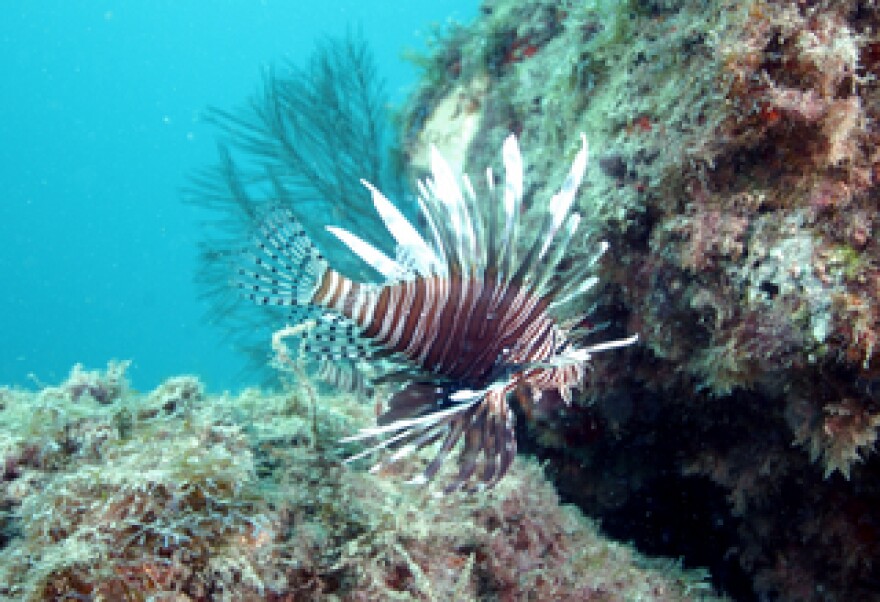In the ongoing battle against a non-native fish invading state waters, a Senate committee passed a bill today that prohibits lionfish from being imported or raised in Florida. Fish sellers say they support the general idea of the ban but still have some reservations.
Tanks full of colorful fish line the walls of Carol’s Critters pet shop in Tallahassee, where Jerry Peterson holds the title of Fish Manager. He stops next to a 75-gallon tank. This, he says, is where the lionfish would be if they were in stock.
Peterson says, “Usually the ones that we get are like 2-to-3 inches, so they’re babies. But yeah, generally, we try to keep them in as large a tank as possible, kind of separated from small fish, obviously."
That’s probably because the pet shop doesn’t want to lose a lot of small fish.
“They’ll eat any and everything. We’ve found lionfish with more than 30 fish in their stomach," says Claire Thomas. She's studied invasive lionfish at the Cape Eleuthera Institute in the Bahamas and says Florida is not alone in dealing with the beautiful yet voracious predators. Biologists say they first showed up off the coast of South Florida in the mid-80’s after being imported from Indo-Pacific waters and then most likely released from an aquarium.
“And now they stretch all the way south to Venezuela, north up the coast of the United States to New York City," Thomas says.
She says the spiny, venemous fish can survive in most habitats, reproduce quickly and don’t have any natural predators—allowing them to ravage Florida’s fragile coral reef ecosystems.
“We over here would completely support the idea of not allowing any further import—although it’s already a problem there," she says.
On Thursday, the Senate Environmental Preservation and Conservation Committee unanimously approved the import ban sponsored by Sen. Greg Evers (R-Baker). It would also prohibit raising the fish in captivity and selling imported lionfish.
Scott Hughes, who owns Fort Pierce-based Saltwaterfish.com, says he has mixed feelings about the proposal.
On one hand, he says, “That restriction would put me at a disadvantage versus others that are not based in Florida.”
But he says he actually supports the ban on importing the two lionfish species already present in Florida—as long as he can continue selling lionfish caught in the Atlantic Ocean, for which he charges $25 a pop.
“We’ve been buying Florida Atlantic lionfish for three, four years," he says. "We’ve probably been at the forefront of this, trying to create a market and get them out of the waters.”
Getting them out of Florida’s waters has also been on the minds of Florida Fish and Wildlife Conservation Commission staff. Spokeswoman Amanda Nalley says proposals currently before the Commission include the creation of lionfish tournaments, loosening fishing restrictions and—yes—a ban on importing and raising them.
"Really anything that we can do to control that lionfish population is something that we’re probably going to try," Nalley says.
So even if the Legislature doesn’t pass it, a ban could still go into effect later this year.
CORRECTIONS: This story originally said lionfish came from the "Far East" rather than the Indo-Pacific. It also said lionfish are "poisonous," when in fact they are venomous. That means they are safe to eat, though they do inject venom to protect themselves. Also, Thomas says the fish have no natural predators, while this story originally said they "don't have many natural predators."

